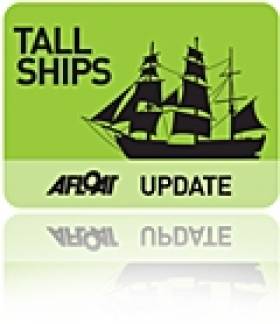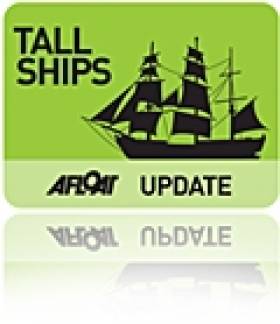Displaying items by tag: Fondation Belem
Grand Old Lady of the Sea Belém Visits Galway
#TALLSHIP GALWAY – Not all tallships visiting Irish waters were concentrated in Dublin Port for the successful tallships festival, as the French three-masted barque Belém, built in 1896, docked into Galway Harbour last week, writes Jehan Ashmore.
She moored alongside the North Dun Aengus Quay, in the single dock basin port, where the veteran vessel (116 years old!) stayed for two nights. On board were 49 trainees who had made the passage from St. Malo in Brittany.
Belém which is run by the Paris based Belem Fondation, has had a long and varied career, as previously reported on Afloat.ie.
According to Galway Harbour Master, Brian Sheridan she has had an "interesting history" trading mostly to the West Indies and Guyana before being owned by the Duke of Westminster and also by Arthur Ernest Guinness.
In recent years Belém has called to several Irish ports, with the last visit to Galway in 2007 and also to Dublin in 2010 for the inaugural French Market Festival. She also took part in the first Tall Ships Races to be hsoted in Waterford in 2006.
She has also been involved in transporting commercial quantities of wine between Bordeaux and Quebec and also on a publicity wine-trade marketing visit to Dublin, prior to her call in 2010.
Alliance Franҫcaise de Cork and Fondation Belém in association with the Port of Cork are pleased to announce arrival of the French tall-ship fleet, Belém, a 116-year old barque at one stage owned by the Guinness family, writes Jehan Ashmore.
During her four-day stay the pride of the French tall-ship fleet is to berth at Albert Quay, in the heart of Cork city-centre where the public can thread her timber decks on Saturday (2 July) between 11.30-17.00 hours and on Sunday (3 July) starting from 10.00 till 18.00 hours. There is an admission of €5 for adults, a concession of €3 and a family ticket costs €10.
Visitors can trace her long and varied career with an exhibit housed below decks of the historic vessel which was built in 1896 in Nantes. For nearly two decades she crossed the Atlantic transporting a diverse cargo but mostly spices, sugar and cocoa beans from her namesake port of Belém do Pará, on the north-east coast of Brazil bound for France. She would sail upriver on the River Seine to supply the cocoa beans for a Paris-based chocolate-maker.
Belem would later become under the British flag and she became the property of the Duke of Westminster, who converted her to a luxury pleasure yacht. In 1921 she was sold to the Hon. Arthur Ernest Guinness, who renamed her Fantôme II and took part in the Cowes regattas and cruised around the world between 1923 and 1924 with his family.
To read more on the vessel's other career's under several owners until her present-day role as a sail-training vessel operated by the Fondation Belém click HERE and also www.portofcork.ie
In addition to visitors boarding the Belem, the public are invited to attend free readings by the Cork poets William Wall and Thomas McCarthy. Accompanying the poets are French writers Maylis de Kerangal and Olivier Sebban for a session of Franco-Irish readings which too takes place on the Saturday evening between 18.00 -19.30 hours.
For further information contact Vytenė Laučytė, Cultural Coordinator, Alliance Franҫaise de Cork Tel: (021) 431 0677 or by email: [email protected]
All advance bookings for the visit on board the Belem are to be made at Alliance Franҫaise de Cork. Tickets are also available at the entrance to the tallship alongside Albert Quay, Cork. Last year Alliance Francaise celebrated its 50th anniversary
- Cork Harbour
- port of Cork
- Brazil
- Alliance Française
- Cork Harbour News
- Paris
- Belem
- Arthur Ernest Guinness
- Cocoa
- TallShips
- Albert Quay Cork
- Fondation Belem
- Tall Ships news
- Duke of Westminster
- Guinness
- Paris chocolate makers
- Fantome II
- William Wall
- Thomas McCarthy
- Cork poets
- French writers
- Maylis de Kerangal
- Olivier Sebban

























































